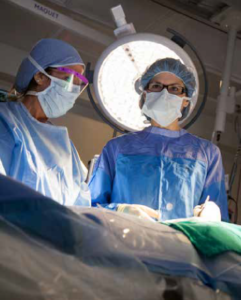Pancreas cancer has long been a heartbreaking disease. Among the deadliest major cancers, there are no reliable early warning signs, so patients often are diagnosed at later stages with limited treatment options. The five-year survival rate is at 12 percent—a number that has largely been unchanged in the past 40 years.
We need to turn the tide on this devastating cancer. UW Carbone is committed to pursuing cutting-edge research and recruiting talented scientists to innovate and bring new ideas to prevention, early diagnosis, and more effective treatments.
ADVANCING RESEARCH. PROVIDING OUTSTANDING CARE.
Supporting survivors
Ready to support pancreas cancer research at the UW Carbone Cancer Center? Email curecancer@supportuw.org, call (608) 264-5437 or visit wiscmedicine.org/cancer to learn more about advancing innovative cancer research and treatment at the UW Carbone Cancer Center. Contributions enable researchers to explore new ideas, purchase new technology for effective cancer research and develop better methods of diagnosing, treating and preventing cancer.


Program Highlights
Resolving early diagnosis
The majority of pancreas cancer patients have limited treatment options and poor outcomes because their disease has spread to become metastatic cancer. Pancreas cancer does not cause noticeable symptoms in the earliest, most treatable stages.
Finding effective methods of early detection is crucial to help increase survival for pancreas cancer patients.
Dr. Muhammed Murtaza’s research centers on how to effectively capture circulating tumor DNA and cells in patients’ blood, a technique known as liquid biopsy. In addition to applications with early detection, liquid biopsies can help clinicians track cancer progression and evaluate the effectiveness of therapies.
Improved imaging is another crucial component of better detection and assessment of pancreas cancer. Dr. Ali Pirasteh is leading a team to investigate methods of earlier pancreas cancer detection by targeting the tumor microenvironment with hybrid molecular imaging, including positron emission tomography (PET) and magnetic resonance imaging (MRI). This combined imaging uses small amounts of radioactive materials to evaluate organ and tissue functions, which may help detect the early onset of disease.
Innovating therapies
Understanding the unique aspects of a patient’s genomics and tumor environment helps to predict which treatments have the best chance of being successful.
Dr. Quanyin Hu’s lab is exploring novel drug delivery systems for modulating the tumor microenvironment. Taking inspiration from the body’s natural cells, the lab engineers cells and cell derivatives as vehicles to more effectively deliver targeted therapy. They also work to modulate immune response by leveraging the interaction between synthetic materials and immune cells.
One example is a new biodegradable gel for use after tumor excision. The gel releases drugs and antibodies to fight macrophages that interfere with immune response and stimulate T cells to attack remaining cancer cells. This gel has been promising in mouse models.
Dr. Jeremy Kratz has been investigating the role of transcriptional targets to treat advanced pancreas cancer. Transcription is the first phase of gene expression and key regulators of cancer proliferation and adaptation. These investigations are performed from patient tumors that are grown in 3 dimensions from patients. Kratz’ team is testing how transcriptional targets in pancreas cancer respond under the selective pressure of therapeutic challenge to both established and novel therapies.
Prevention and outreach
In addition to researching new diagnostic and treatment methods, UW Carbone researchers are also focused on identifying risk factors of pancreas cancer.
Dr. Sean Ronnekleiv-Kelly is leading research on how chronic disruption of a person’s circadian clock, such as through jet lag or poor sleep habits, can influence the development and aggressiveness of pancreas cancer. Understanding the genomic factors that regulate circadian cycle may help personalize novel treatment strategies in the future.
Understanding the rates of pancreas cancer diagnosis and treatment, and disparities that exist among people of different geographic, socioeconomic and racial groups, is also important to ensuring equity in access to care and treatments.
Dr. Noelle LoConte led a study that found Black patients with pancreas cancer in Wisconsin are half as likely to be treated for pancreas cancer as non- Hispanic white patients, and as a result have higher mortality rates. She found that access to treatment was a critical barrier for these patients.
UW Carbone is also focused on improved cancer modeling by using existing population and health data. Those efforts, directed by Dr. Nabeel Zafar, seek to identify trends that indicate high-risk groups who may benefit from surveillance and more personalized treatment options.
In 2020, UW Carbone launched its Pancreas Cancer Prevention Clinic. The initiative, spearheaded by Dr. Rebecca Minter, monitors patients who have an increased genetic risk of developing pancreas cancer, as well as those who have mucin-producing cysts in the pancreas. While most cysts do not become cancerous, this clinic works proactively to survey these findings to prevent the rare instances of malignancy.